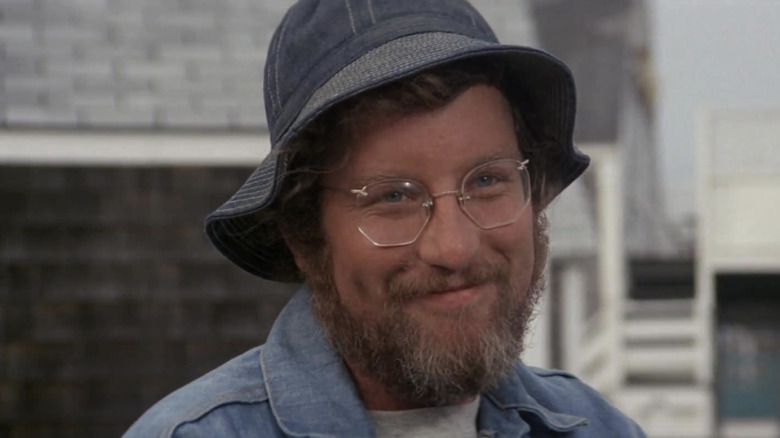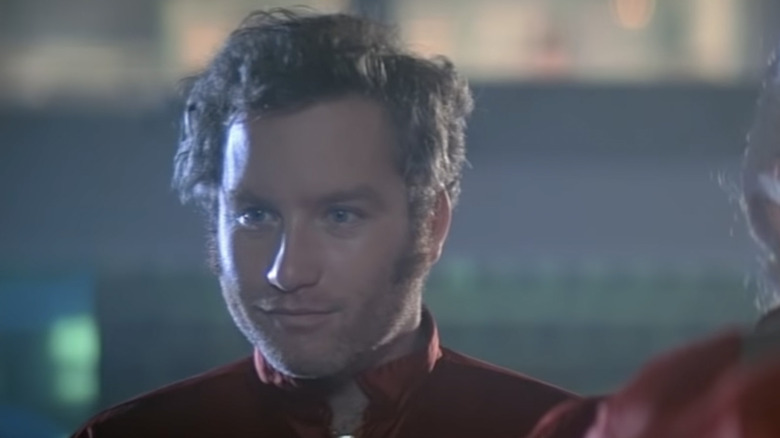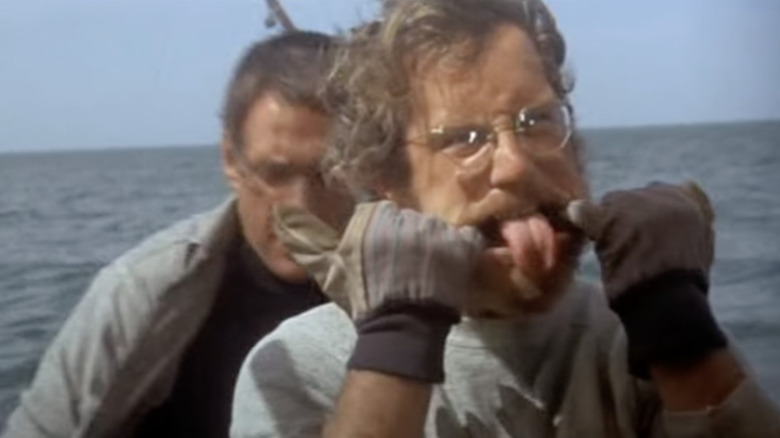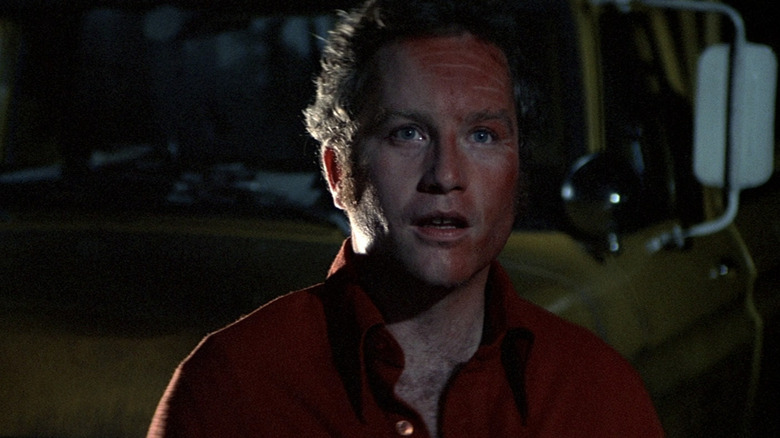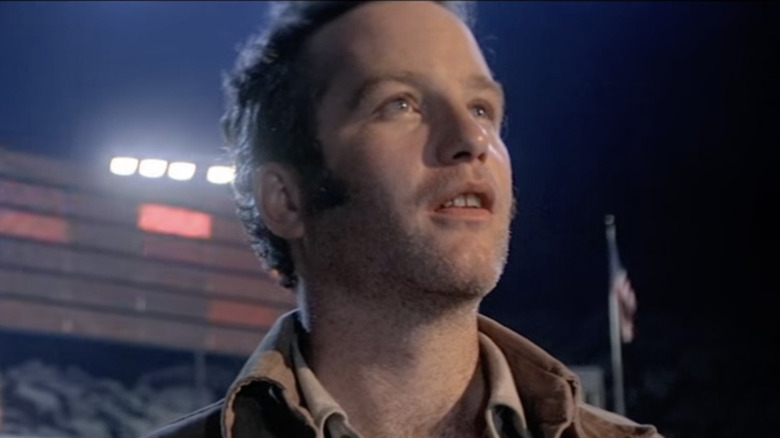Richard Dreyfuss Never Doubted That He Would Be A Hollywood Star
After acting in theater and playing bit parts on various television shows, Richard Dreyfuss broke into Hollywood with the role of Curtis Henderson in George Lucas' "American Graffiti." Following his success in the classic coming-of-age film, Dreyfuss portrayed the sarcastic marine biologist Matt Hooper in Steven Spielberg's "Jaws." In 1977, he teamed up with Spielberg again for "Close Encounters of the Third Kind," portraying the obsessive Roy Neary. When it seemed like Dreyfuss' star couldn't shine brighter, Dreyfuss won an Oscar for portraying Elliot Garfield in 1978's "The Goodbye Girl."
For '70s audiences, it must have felt like Dreyfuss came out of nowhere — landing roles with Hollywood's hottest and new directors. During a 1978 interview with Rolling Stone, the star revealed that many of his peers called him "arrogant" at that time — especially when he won an Academy Award before hitting 30. But the young actor wasn't at all surprised by his success. In a recent interview with The Talks, Dreyfuss discussed how he always knew he'd have a successful acting career.
I am an artist. I knew it then.
Los Angeles and New York are full of struggling actors working in the restaurant and retail industry while juggling reading scripts and auditions. Only a fraction of discovered talents will achieve the massive success of an A-lister. Reasonably, many consider the acting profession to be a risky investment. However, Dreyfuss knew he'd succeed, telling the outlet:
"I had absolutely no doubt that I would absolutely make it. Maybe not by Tuesday and maybe not by Thursday, but did I ever really doubt that I would make it? No."
I bet there are loads of working actors who'd love to know the secret to Dreyfuss' confidence! According to the veteran actor, his career peaked quickly and successfully because he knew his worth.
"I got offers that were way above my paygrade at the time because they were just mewlish about it. They just couldn't believe that actors who were at that stage in their career would do anything but sound like a David Copperfield character and say, "Oh thank you, thank you, thank you, thank you." I had no such interest, especially when what was on the line was a one line or two line role that really had no merit to begin with. I was deadly serious. If one can use the term artist, I am an artist. I knew it then."
I wasn't an adult yet.
Ayoung actor had confidence in his goals and worth as an artist, but he was still human, which meant he struggled with occasional insecurities in his early career.
"I had a lot of doubts when it came to certain roles and for instance, no one realizes it, but what I was most afraid of was playing an adult — because I wasn't an adult yet."
But Dreyfuss figured out how to turn his insecurities into a strength by portraying adult characters with childlike qualities, which he connected with personally, and felt more comfortable emulating on screen. Luckily for Dreyfuss, he entered Hollywood alongside Spielberg, who perfected the art of blending adults with youthful characteristics. In Dreyfuss' first Spielberg film, he portrayed Matt Hooper. On the surface, the highly educated Oceanographer is very much a grown-up, but, like a lot of Spielberg's characters, he's full of childlike wonder and a bit immature.
In "Jaws," Hooper recalls falling in love with sharks as a boy after seeing one devour his boat. After the event, Hooper is motivated by this childhood obsession. Even after the massive creature swallows beachgoers, the scientist remains excited by a shark's teeth and stomach content. Throughout the film, Hooper showcases immaturity, like when he makes mocking faces behind Quint's back.
I proceeded to bad-mouth everybody.
Dreyfuss was aware of his insecurities about playing serious roles, as he spent his early career perfecting childish characters. At the 2018 Sedona Film Festival, he shared how his real-life tendency to retreat into immature behaviors won him one of his biggest roles. Originally, Roy Nearly was written as a serious, lifelong, military man — a character that didn't interest Dreyfuss. However, when Spielberg's vision drifted away from that version of the character, Dreyfus' interest was piqued. He wouldn't risk losing the role to anyone else in Hollywood, so he trash-talked peers instead.
"[I] proceeded to bad mouth everybody. I would just walk by his office and say, 'Al Pacino has no sense of humor,' and 'Robert De Niro is crazy," and, I don't care. I just made things up, and I didn't care."
Was this immature behavior? Yes, but Dreyfuss believed he had a unique understanding of Neary that others didn't:
"One day, I leaned into his office, and I said, 'Steven, you need a child,' and he looked up and said, 'You got the part.' I knew he needed a man, who had a family, but had a child inside him."
Dreyfuss' unique talent
Of course, Dreyfuss was spot-on, as Neary is even more childish than Hooper. In "Close Encounters of the Third Kind," Neary witnesses a UFO and becomes obsessed with them. He neglects any adult responsibility in his life — ignoring his family. When his wife leaves him, Neary barely notices. In fact, he takes advantage of the empty space and constructs massive mud towers in his living room.
Most adults can't understand Hooper's obsession with killer sharks or Neary's decision to ride off with aliens because they're characters driven by the wonder of youth that rarely survives adulthood. However, as the actor has always suspected, Dreyfuss has a special knack for showing us fascinating adult characters.
Sure, Dreyfuss' confidence and acting chops helped him achieve his dreams. But that wasn't all he had going for him. Unlike his peer group, Dreyfuss can uniquely recapture the awe, allure, and immaturity of youth. (Also, a tight bond and working relationship with Spielberg never hurts.)
